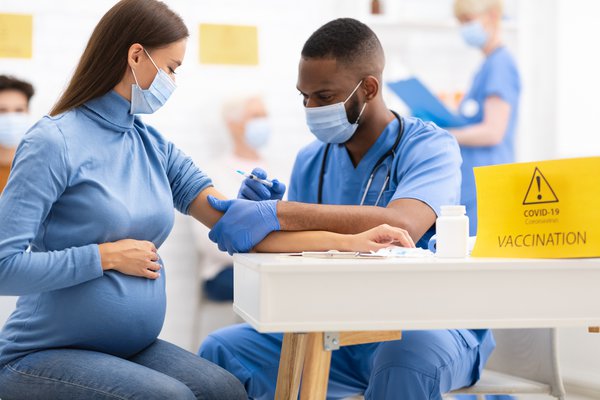Last December, a German epidemiologist and chronic vaccine skeptic noted that there are some structural similarities between the coronavirus and a placental protein called syncytin-1. He suggested that if people of childbearing years get the COVID-19 vaccine, they might therefore develop antibodies that could attack their placenta during pregnancy.
Together with a former Pfizer employee, this doctor petitioned the European equivalent of the Food and Drug Administration (FDA) to delay approval of the Pfizer/BioNTech COVID-19 vaccine. This petition was rejected, but meanwhile the epidemiologist’s theory got widely spread by conspiracy theorists.
- MORE ON HEALTH & WELLNESS
- Why you should be getting an eye exam annually
- How to help anxious kids cope with the return to in-person learning
- A firsthand account of being pregnant during the COVID-19 pandemic
There is also a rumor circulating that vaccination might affect male fertility. This rumor is based on the fact that having a fever, for any reason — including as a vaccination side effect — can reduce male fertility for about three months. But this effect is temporary.
Still, as a result of these rumors, some people have been reluctant to get vaccinated, fearing that the vaccine would leave them unable to have children.
The reality
The similarities between syncytin-1 and the coronavirus are so minor that the German doctor’s theory is quite far-fetched. And indeed, the evidence against it is very clear!
Vaccines have to go through rigorous clinical trials before they can be authorized by the FDA and other global regulatory bodies. First, they are tested in animals, then in people. And they must consistently demonstrate safety in order to get FDA authorization.
Well, the COVID-19 vaccines did not affect fertility in animals in any way. And during the human clinical trials of the Pfizer-BioNTech vaccine, for example, 23 participants became pregnant — twelve in the vaccine group and eleven in the placebo group. None of them had any problems with their pregnancy or delivery.
Preliminary data about vaccination in the general population suggests that the vaccines have no negative effect on those who are pregnant or their babies. In an interview with the New England Journal of Medicine, CDC Director Rochelle P. Walensky, MD, MPH said: “[There is] growing evidence confirming that pregnant people develop a robust immune response to COVID-19 vaccination, without so far seeing any adverse events to the mom or the fetus.”
The American College of Obstetrics and Gynecology (ACOG) concurs: “Unfounded claims linking COVID-19 vaccines to infertility have been scientifically disproven.”
Experts also agree that vaccination poses no risk of future infertility among teens.
The consequences of NOT getting vaccinated
We have no reason to think that vaccination poses any danger to those who are pregnant (or who might become pregnant in the future), or to their babies. And we know that not getting vaccinated puts both parents and babies in danger.
Being pregnant or recently pregnant increases your risk of severe illness from COVID-19. Severe illness can involve hospitalization, intensive care, and the need for ventilators or other special breathing equipment. Severe illness can also result in death.
Coronavirus infection can also increase your likelihood of having a premature baby, as well as other poor outcomes such as pregnancy loss.
And, some babies born to people with COVID-19 have tested positive for COVID-19 shortly after birth. We don’t know if those babies got sick before, during, or after delivery. Mostly they had mild or no symptoms … but a few developed severe illness.
If you’re pregnant, you may be at even higher risk of severe illness from COVID-19 if you have certain underlying health conditions such as chronic lung disease, hypertension, cardiovascular disease, diabetes, or obesity. Your ethnicity, age, and occupation can also be a factor. COVID-19 infection may also affect male fertility.
By contrast, it’s been shown that those receiving mRNA vaccines (like Pfizer-BioNTech or Moderna) during the third trimester develop a strong immune response that is passed on to newborns.
“ACOG recommends vaccination for all eligible people who may consider future pregnancy,” the association said in its April 2021 Practice Advisory. “ACOG recommends that pregnant individuals have access to COVID-19 vaccines.”
Similarly, those who are breastfeeding can and should get vaccinated. The CDC says, “Recent reports have shown that breastfeeding people who have received COVID-19 mRNA vaccines have antibodies in their breastmilk, which could help protect their babies.” And ACOG says, “COVID-19 vaccines should be offered to lactating individuals similar to non-lactating individuals.”
If you have any lingering doubts, please talk to your health care provider! Ask them any questions you like. I’m pretty sure they will back me up in recommending vaccination.
Personally, I can’t wait until the FDA authorizes the vaccines’ use in my children’s age group, so I can breathe a sigh of relief and know they are protected!
This content was originally published on IBX Insights.
About Dr. Reetika Kumar
Dr. Reetika Kumar has served as medical director and vice president of Clinical Services at Independence Health Group since 2017. Her expertise and commitment to improving the health of our members is focused on proven practices, evidenced-based medicine, and cost-effective health care delivery. Reetika is a mom of two amazing kids and stays active during the pandemic with the Peloton Female Physicians group.



